To make it simple, I’ll state what stands out to me about AnoHana right here in the first sentence – it’s the best show of 2011 so far, and it isn’t even close.
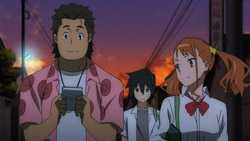 There are a lot of things I love about this show, and a lot of things that flat-out amaze me about it. In that second category would be the amount of emotional firepower writer Mari Okada and director Tatsuyuki Nagai were able to pack into each episode without the pacing seeming rushed. The core cast of the show is fairly large – six kids – and each of them was already clearly established as a complex, layered and sympathetic character by the second episode. That was an absolutely necessary step to give impact and weight to their struggles over the short 11-episode run. And as that run and we learned a little more about each member of the Super Peace Busters, they became more and more real. It’s an ensemble cast with no stock or throwaway characters – they’re all originals, all flawed but ultimately decent kids who struggle with their own limitations.
There are a lot of things I love about this show, and a lot of things that flat-out amaze me about it. In that second category would be the amount of emotional firepower writer Mari Okada and director Tatsuyuki Nagai were able to pack into each episode without the pacing seeming rushed. The core cast of the show is fairly large – six kids – and each of them was already clearly established as a complex, layered and sympathetic character by the second episode. That was an absolutely necessary step to give impact and weight to their struggles over the short 11-episode run. And as that run and we learned a little more about each member of the Super Peace Busters, they became more and more real. It’s an ensemble cast with no stock or throwaway characters – they’re all originals, all flawed but ultimately decent kids who struggle with their own limitations.
This show was fascinating in its refusal to be pulled into the genre traps other series fall victim to. Despite the tugging of some viewers and what must have been terrible temptation, Okada resisted the urge to focus heavily on romance. Yes, stifled romantic feelings were important – Yukiatsu for Menma, Anaru for Jintan, Tsuruko for Yukiatsu… And then there was the unexpressed (though surely understood) mutual love between Jintan and Menma. It was a mess – but these traumas were used mostly to illuminate the larger topics of selfishness, grief, regret and forgiveness. Right to the very end we were spared a “pairings” focused finale – that door is left conspicuously open, not least to interpretation.
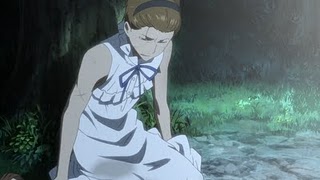
So AnoHana was that rare species, a real drama – a drama about teenagers, no less – without much romance. It was really a simple story in the end – one tragic death of a child and the lasting impact it had on her friends and her family. Even the magical realism element was used in a very straightforward way to force the survivors to confront their grief and to accept both the hardships of life and their own failings, and to try and move on. The show was never about Menma, but the impact Menma had on the world, both as a live girl and as a ghost.
That impact was most obvious on Jintan, of course. A character drama is naturally only as strong as its characters. Jintan was the emotional heart of the story, a thankless role that forced him to be the heavy a lot of the time. When the fans wanted him to toss Menma aside and be with Anaru, he couldn’t – things simply weren’t finished between he and Menma. Jintan was, as Yukiatsu called him, a beaten dog. The weight of loss transformed him from a natural leader and an energetic child to a hesitant, quiet teenager. It wasn’t a role destined to win him much love on-screen or off, but I felt Jintan was a fascinating and empathetic presence at the center of all the events of the series.
 The other Busters all proved to be superb characters as well. Anaru was the heart-on-sleeve, emotionally vulnerable romantic of the bunch – hopelessly in love with a boy still in love with a memory. Yukiatsi and Tsuruko always seemed to move in and out of the narrative as a pair, yet Tsuruko’s unrequited love for him and his obsessive love for Menma and jealousy of Jintan erected a wall between them. Poppo was the simplest of the group in many ways, but he perhaps grew as much as any of them by the close of the series, culminating with a superb arc closure in the finale. Important supporting characters were introduced as well, such as Jintan’s father and Menma’s brother, who managed to be complicated people despite only appearing in a few episodes.
The other Busters all proved to be superb characters as well. Anaru was the heart-on-sleeve, emotionally vulnerable romantic of the bunch – hopelessly in love with a boy still in love with a memory. Yukiatsi and Tsuruko always seemed to move in and out of the narrative as a pair, yet Tsuruko’s unrequited love for him and his obsessive love for Menma and jealousy of Jintan erected a wall between them. Poppo was the simplest of the group in many ways, but he perhaps grew as much as any of them by the close of the series, culminating with a superb arc closure in the finale. Important supporting characters were introduced as well, such as Jintan’s father and Menma’s brother, who managed to be complicated people despite only appearing in a few episodes.
No discussion of the characters could be complete without Menma herself. Whatever Menma was,, she was a catalyst – the defining figure in the lives of everyone around her. Tragically gone too young, her return set the events of the series in motion. It took a while, but she eventually became more than a symbol and as real a person as the friends who outlived her. Still in many ways the little girl she’d ben when she died, Menma actually grew in understanding – in effect, going through adolescence as a ghost by observing and interacting with Jintan and the others. She became aware of the depth of feeling she and Jintan shared, and the anguish it caused the others. She began to seriously question her own existence, and what she might accomplish during the time she was given to walk amongst her loved ones again.
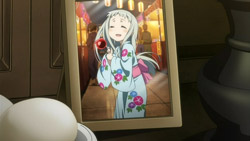
But Menma didn’t make everyone’s pain go away – in fact, she forced them to confront it. But in doing so she fulfilled her promise to Jintan’s mother and allowed her family and the Super Peace Busters to face down and accept that they were all selfish, flawed and damaged people. The message here isn’t that pain and selfishness are bad things – witness Jintan’s mother’s desire to see her son confront his own grief. Rather, the message is that only by forgiving others and ourselves for our frailty might we have a chance to be happy. Being happy is hard work and it can’t be done alone, but fortunately it doesn’t have to be.
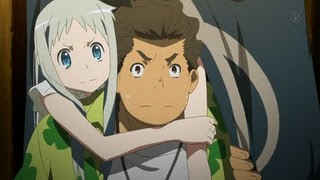
Okada got things right in the end by not trying to do much. Perhaps best of all, she resisted trying to explain too much and to offer an artificial “closure” that would have been a betrayal of the complexity of the characters she’d built. Even as it became apparent that Menma’s wish wasn’t the point at all, it also became clear that the nature of her existence was irrelevant too. She simply was – however she came to be, there was unfinished business that had to be addressed before the circle of people who she loved could move on with their lives. There was far, far too much damage done for everyone to forget their guilt or find their natural partner and ride off in bliss at the end. But they could, at least, accept their grief and the selfish nature of it, and understand the depth of what they all shared – their love for Menma and their need for each other.
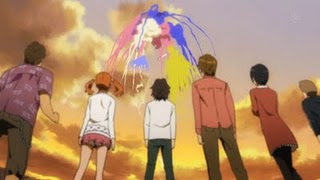 In the end, where AnoHana succeeded in spectacular fashion was in making me feel. Okada had already shown an ability to create an immense emotional impact in a one-cour series, especially with True Tears, and this show was arguably her finest effort to date. Entertaining is one thing, but really investing the viewer in the characters on-screen – turning them into real people – is a rare achievement indeed. 11 episodes and not a one of them less than excellent, every moment packed with character development and exposition – yet the show never felt rushed or overcrowded. There wasn’t an ounce of fat on it – every moment was important.
In the end, where AnoHana succeeded in spectacular fashion was in making me feel. Okada had already shown an ability to create an immense emotional impact in a one-cour series, especially with True Tears, and this show was arguably her finest effort to date. Entertaining is one thing, but really investing the viewer in the characters on-screen – turning them into real people – is a rare achievement indeed. 11 episodes and not a one of them less than excellent, every moment packed with character development and exposition – yet the show never felt rushed or overcrowded. There wasn’t an ounce of fat on it – every moment was important.
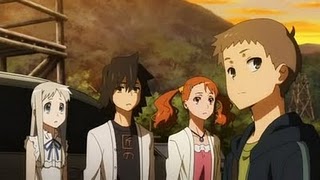 We’ve come to expect fine work from A-1 Pictures, who’ve been one of the best studios around for the past few years. AnoHana is their best series to date, without question. While lacking the lush visual extravagance of HanaIro, it’s crisply and beautifully animated, full of small visual details. The OP and ED suit the material perfectly, and BGM is respectfully restrained – a wise choice given the inherent kick to the material itself. The entire cast is excellent, but it’s a great joy to hear the Cross Game trio of Miyu-Miyu, Haruka Tomatsu and Takhiro Sakurai together again in a great anime. Wonderful seiyuu individually, their chemistry as a group is off the charts – especially Miyu and Tomatsu. They play off each other flawlessly and effortlessly and elevate already profound material into something even more special.
We’ve come to expect fine work from A-1 Pictures, who’ve been one of the best studios around for the past few years. AnoHana is their best series to date, without question. While lacking the lush visual extravagance of HanaIro, it’s crisply and beautifully animated, full of small visual details. The OP and ED suit the material perfectly, and BGM is respectfully restrained – a wise choice given the inherent kick to the material itself. The entire cast is excellent, but it’s a great joy to hear the Cross Game trio of Miyu-Miyu, Haruka Tomatsu and Takhiro Sakurai together again in a great anime. Wonderful seiyuu individually, their chemistry as a group is off the charts – especially Miyu and Tomatsu. They play off each other flawlessly and effortlessly and elevate already profound material into something even more special.
In sum – a great series, and I don’t toss that adjective around lightly. This is the best anime of 2011 to date and one of the best for several years. I’m delighted it seems to have found an audience both enthusiastic and large, and brought some much-deserved success back to the struggling NoitaminA block. A simple show about love, forgiveness, grief and growing up, AnoHana is a credit to everyone involved.


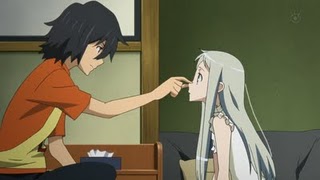
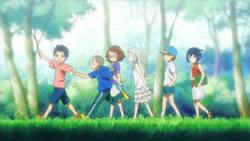
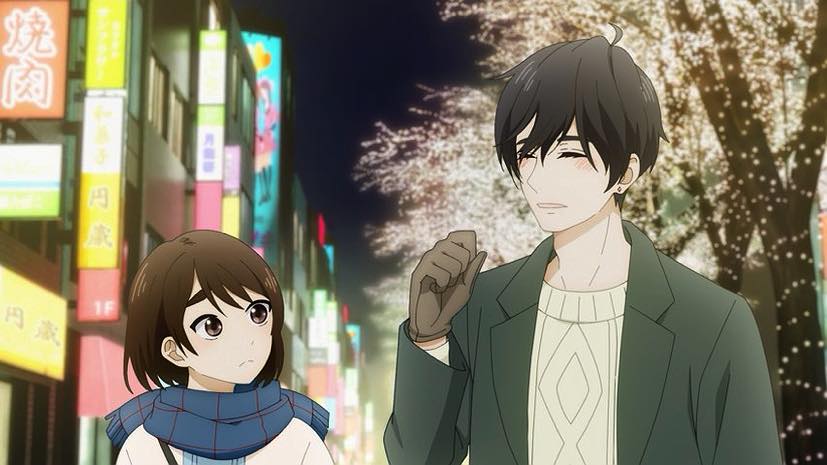
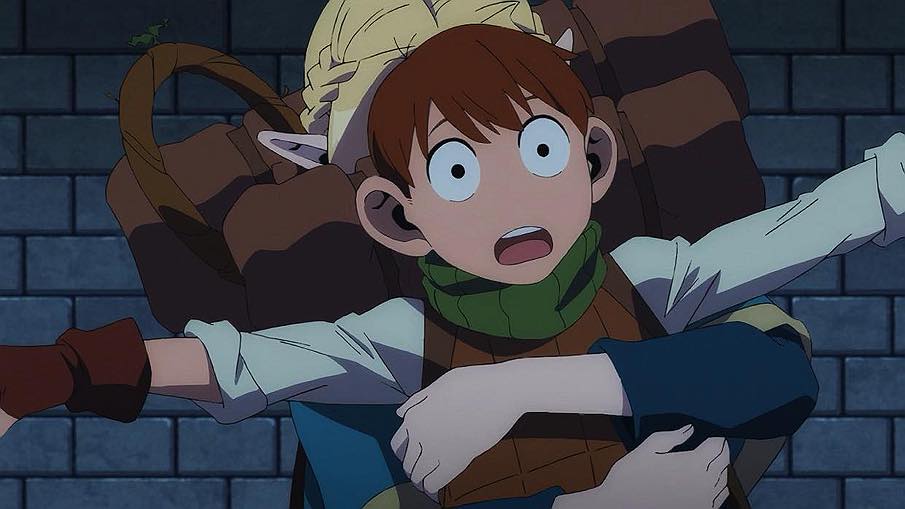
Hotaruzuki
June 29, 2011 at 5:01 pmYao~ From Random Curiosity checking out your blog!
Beautiful series analysis, worthy of the show in question!
admin
June 29, 2011 at 5:28 pmWoot – thank you and welcome! Hope to hear from you again, Hotaruzuki. AnoHana was an easy series to write about, TBH – simple yet subtle and wonderful.